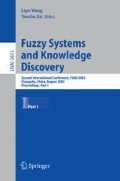Abstract
It is proved that a pair of dual fuzzy rough approximation operators can induce a topological space if and only if the fuzzy relation is reflexive and transitive. The sufficient and necessary condition that a fuzzy interior (closure) operator derived from a fuzzy topological space can associate with a fuzzy reflexive and transitive relation such that the induced fuzzy lower (upper) approximation operator is the fuzzy interior (closure) operator is also examined.
Access this chapter
Tax calculation will be finalised at checkout
Purchases are for personal use only
Preview
Unable to display preview. Download preview PDF.
References
Pawlak, Z.: Rough sets. International Journal of Computer and Information Science 11, 341–356 (1982)
Pomykala, J.A.: Approximation operations in approximation space. Bulletin of the Polish Academy of Sciences: Mathematics 35, 653–662 (1987)
Wybraniec-Skardowska, U.: On a generalization of approximation space. Bulletin of the Polish Academy of Sciences: Mathematics 37, 51–61 (1989)
Yao, Y.Y.: Generalized rough set model. In: Polkowski, L., Skowron, A. (eds.) Rough Sets in Knowledge Discovery 1. Methodology and Applications, pp. 286–318. Physica, Heidelberg (1998)
Zhang, W.-X., Leung, Y., Wu, W.-Z.: Information Systems and Knowledge Discovery. Science Press, Beijing (2003)
Zhang, W.-X., Wu, W.-Z., Liang, J.-Y., Li, D.-Y.: Rough Set Theory and Approach. Science Press, Beijing (2001)
Wu, W.-Z., Zhang, W.-X.: Neighborhood operator systems and approximations. Information Sciences 144, 201–217 (2002)
Yao, Y.Y.: Relational interpretations of neighborhood operators and rough set approximation operators. Information Sciences 111, 239–259 (1998)
Lin, T.Y., Liu, Q.: Rough approximate operators: axiomatic rough set theory. In: Ziarko, W. (ed.) Rough Sets, Fuzzy Sets and Knowledge Discovery, pp. 256–260. Springer, Heidelberg (1994)
Thiele, H.: On axiomatic characterisations of crisp approximation operators. Information Sciences 129, 221–226 (2000)
Yao, Y.Y.: Constructive and algebraic methods of the theory of rough sets. Journal of Information Sciences 109, 21–47 (1998)
Boixader, D., Jacas, J., Recasens, J.: Upper and lower approximations of fuzzy sets. International Journal of General Systems 29, 555–568 (2000)
Dubois, D., Prade, H.: Rough fuzzy sets and fuzzy rough sets. International Journal of General Systems 17, 191–208 (1990)
Mi, J.-S., Zhang, W.-X.: An axiomatic characterization of a fuzzy generalization of rough sets. Information Sciences 160, 235–249 (2004)
Morsi, N.N., Yakout, M.M.: Axiomatics for fuzzy rough sets. Fuzzy Sets and Systems 100, 327–342 (1998)
Radzikowska, A.M., Kerre, E.E.: A comparative study of fuzzy rough sets. Fuzzy Sets and Systems 126, 137–155 (2002)
Thiele, H.: On axiomatic characterisation of fuzzy approximation operators I, the fuzzy rough set based case. In: Ziarko, W.P., Yao, Y. (eds.) RSCTC 2000. LNCS (LNAI), vol. 2005, pp. 239–247. Springer, Heidelberg (2001)
Thiele, H.: On axiomatic characterisation of fuzzy approximation operators II, the rough fuzzy set based case. In: Proceedings of the 31st IEEE International Symposium on Multiple-Valued Logic, pp. 330–335 (2001)
Thiele, H.: On axiomatic characterization of fuzzy approximation operators III, the fuzzy diamond and fuzzy box cases. In: The 10th IEEE International Conference on Fuzzy Systems, vol. 2, pp. 1148–1151 (2001)
Wu, W.-Z., Leung, Y., Mi, J.-S.: On characterizations of (I,T)-fuzzy rough approximation operators. Fuzzy Sets and Systems (to appear)
Wu, W.-Z., Mi, J.-S., Zhang, W.-X.: Generalized fuzzy rough sets. Information Sciences 151, 263–282 (2003)
Wu, W.-Z., Zhang, W.-X.: Constructive and axiomatic approaches of fuzzy approximation operators. Information Sciences 159, 233–254 (2004)
Yao, Y.Y.: Combination of rough and fuzzy sets based on α-level sets. In: Lin, T.Y., Cercone, N. (eds.) Rough Setsand Data Mining: Analysis for Imprecise Data, pp. 301–321. Kluwer Academic Publishers, Boston (1997)
Nakamura, A., Gao, J.M.: On a KTB-modal fuzzy logic. Fuzzy Sets and Systems 45, 327–334 (1992)
Yao, Y.Y., Lin, T.Y.: Generalization of rough sets using modal logic. Intelligent Automation and Soft Computing: An International Journal 2, 103–120 (1996)
Wasilewska, A.: Conditional knowledge representation systems—model for an implementation. Bulletin of the Polish Academy of Sciences: Mathematics 37, 63–69 (1989)
Wu, W.-Z., Leung, Y., Zhang, W.-X.: Connections between rough set theory and Dempster-Shafer theory of evidence. International Journal of General Systems 31, 405–430 (2002)
Yao, Y.Y., Lingras, P.J.: Interpretations of belief functions in the theory of rough sets. Information Sciences 104, 81–106 (1998)
Chuchro, M.: On rough sets in topological Boolean algebras. In: Ziarko, W. (ed.) Rough Sets, Fuzzy Sets and Knowledge Discovery, Springer-Verlag, New York, pp. 157–160. Springer, Heidelberg (1994)
Chuchro, M.: A certain conception of rough sets in topological Boolean algebras. Bulletin of the Section of Logic 22(1), 9–12 (1993)
Kortelainen, J.: On relationship between modified sets, topological space and rough sets. Fuzzy Sets and Systems 61, 91–95 (1994)
Wiweger, R.: On topological rough sets. Bulletin of Polish Academy of Sciences: Mathematics 37, 89–93 (1989)
Lowen, R.: Fuzzy topological spaces and fuzzy compactness. Journal of Mathematical Analysis and Applications 56, 621–633 (1976)
Author information
Authors and Affiliations
Editor information
Editors and Affiliations
Rights and permissions
Copyright information
© 2005 Springer-Verlag Berlin Heidelberg
About this paper
Cite this paper
Wu, WZ. (2005). A Study on Relationship Between Fuzzy Rough Approximation Operators and Fuzzy Topological Spaces. In: Wang, L., Jin, Y. (eds) Fuzzy Systems and Knowledge Discovery. FSKD 2005. Lecture Notes in Computer Science(), vol 3613. Springer, Berlin, Heidelberg. https://doi.org/10.1007/11539506_21
Download citation
DOI: https://doi.org/10.1007/11539506_21
Publisher Name: Springer, Berlin, Heidelberg
Print ISBN: 978-3-540-28312-6
Online ISBN: 978-3-540-31830-9
eBook Packages: Computer ScienceComputer Science (R0)

